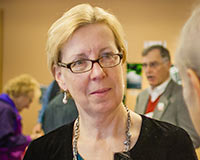Osten Applauds Signing Into Law of Her Temporary Health Care Structures Bill
State Senator Cathy Osten (D-Sprague) today welcomed the signing into law of yet another one of her hallmark bills of the 2017 legislative session: allowing property owners to place temporary health care structures on their land to care for elderly relatives with mental or physical impairments.
Governor Dannel Malloy signed the bill into law on Thursday; it takes effect October 1.
“Connecticut is an aging state, and more people want to remain in their homes for as long as possible, so these temporary structures are a way to accomplish that. The concept was very popular when I toured senior centers last year taking about the idea,” Sen. Osten said. “This new law will allow more of our senior citizens to live out their years with dignity and grace.”
The units would be approximately 300 square feet, ADA compliant, and allow those who use them to have a safe, single-level housing unit — providing the elderly with an option other than moving into a nursing care facility or remodeling their existing home to meet their current health needs.
“I believe this law will go a long way toward our eventual goal of allowing people who require some level of assistance or special accessibility to stay on their own property or on that of a family caregiver,” Sen. Osten said. “In the long run, these temporary healthcare structures could save families a lot of money. Instead of placing a family member in a nursing home, they’d be able to age in place.”
Senate Bill 922, “AN ACT CONCERNING TEMPORARY HEALTH CARE STRUCTURES,” is euphemistically known as the ‘granny pod’ law. It establishes various requirements for the structures, including a maximum size of 500 square feet and a maximum occupancy of one person. The bill does allow cities and towns to opt-out of allowing such structures, but only by a vote of their board of selectmen or town council.
The law defines a “mentally or physically impaired person” as someone who a Connecticut-licensed doctor has certified as need help with two or more daily activities, such as bathing, dressing, grooming, eating, meal preparation, shopping, housekeeping, bathroom needs, laundry, communication, or medication.
Share this page:
